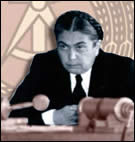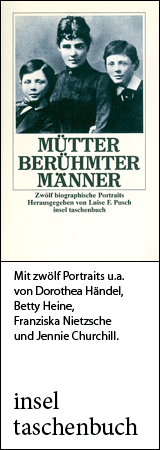
born on February 5, 1902, in Bernburg/Saale, the German Empire
died on April 18, 1989, in Berlin, the German Democratic Republic (GDR)
German politician, first Minister of Justice of the GDR
Biography
Hilde Benjamin, the first woman Minister of Justice not only in the GDR but worldwide, died six months before the fall of the Berlin Wall. Her son Michael suspected that, had she lived to see the end of the GDR, in whose internal structure she had played a key role from the very beginning, “it would have killed her.”
Starting from the beginning of her marriage to Dr. Georg Benjamin (brother of Walter Benjamin) in 1926, she worked for the Communist Party of Germany in Berlin. She believed that the party discipline to which she unconditionally submitted throughout her life required her full commitment. As a young lawyer, she often defended politically persecuted comrades; together with her Jewish husband, she supported the party's work almost daily in every conceivable way.
In April 1933, four months after the birth of their son Michael, Georg Benjamin was taken into “protective custody” for eight months. His wife was banned from working and earned her living in the years that followed in various jobs, including at the Soviet trade mission. In 1936, her husband was again sentenced – to six years in prison. This marked the end of their life as a family of three; instead of being released in 1942, Georg Benjamin was transferred to the Mauthausen concentration camp and died there shortly afterwards from an electric shock.
During his years in prison, Hilde Benjamin – supported by Georg's empathetic advice in letters – took care of her son's emotional and intellectual development in a remarkably sensitive manner. She also helped Jewish fellow citizens, such as the wives of prisoners, who otherwise received little assistance. When Michael was denied admission to high school as a half-Jew, she homeschooled him. In 1948, at the age of sixteen, he graduated with flying colors.
Hilde Benjamin was by then already busy setting up new legal structures in the Soviet zone. She organized crash courses to train lay people with no fascist ties to become so-called people's judges, co-founded the Democratic Women's Union, and in 1949 became vice president of the Supreme Court of the GDR.
In this role, as well as in her later position as Minister of Justice, she initiated and pronounced judgments that earned her comparisons in the Western press with the notorious Nazi judge Freisler. The interrogation of the accused by “Bluthilde” was relentlessly harsh; her condemnation was directed at anyone who did not conform to the party line.
However, her socialist convictions also inspired her commitment to women's rights. With the 1965 Family Law, she laid the foundation for the equal treatment of children born in and out of wedlock, the reform of divorce and name law, and the promotion of women's employment, for which she was even honored in West Germany.
(Text from 2001; translated with DeepL.com; edited by Ramona Fararo, 2025.
Please consult the German version for additional information, pictures, sources, videos, and bibliography.)
Author: Mechthild Winkler-Jordan
Quotes
Hilde Benjamin was undoubtedly a pioneer for women's rights… And yet her handling of power did not serve as a role model for women in East and West… She can rather be seen as a “negative teacher.” Due to her experiences of suffering and her ideological commitment, Hilde Benjamin was not capable of developing into a positive model of a powerful woman. (Benjamin biographer Marianne Brentzel)
If you hold the rights to one or more of the images on this page and object to its/their appearance here, please contact Fembio.



